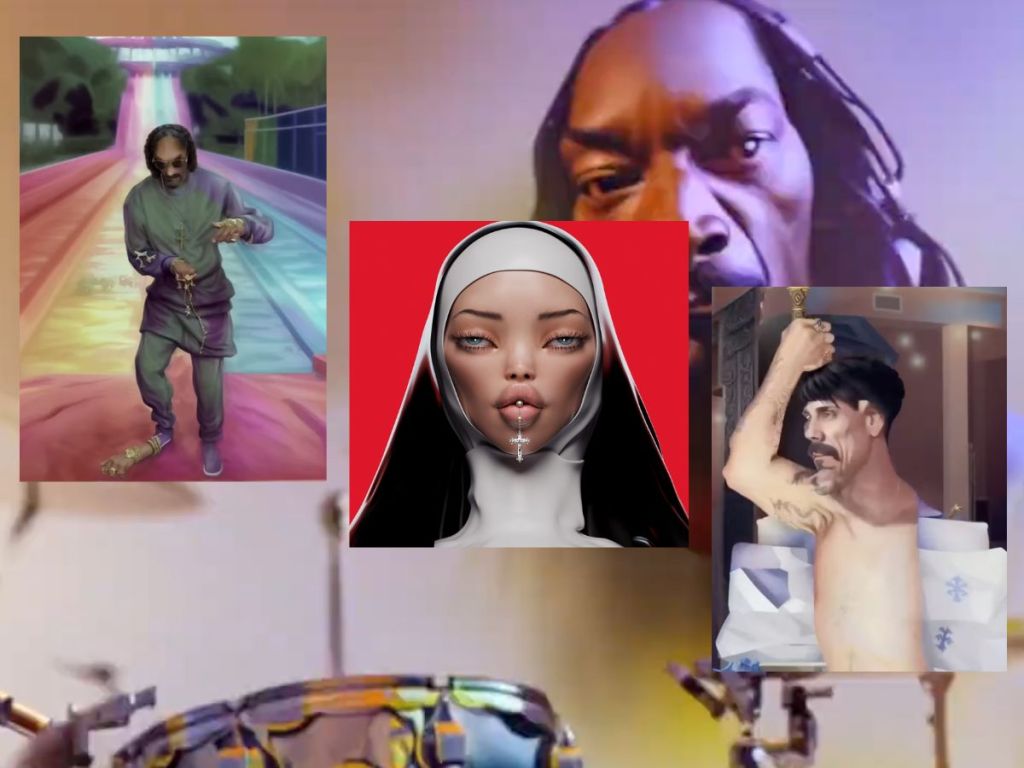The creative industry remains largely opposed to the use of artificial intelligence (AI). In film, actors are fighting Hollywood’s major studios over the studios’ proposal to create “digital replicas” of performers using AI. In music, Spotify went on a purge in May to take down thousands of AI-generated songs.
But not everyone is against the idea of working with AI. Here in Australia, Sydney band The Deep Faith is entirely generated with AI – and it’s probably the first of its kind in the country.
The Deep Faith: beginning with deepfakes
Byron Spencer and Daniel Stricker, both multidisciplinary artists, tell us the idea of starting an AI band came about circa 2014, when “vocaloids” were the trendy technology, largely thanks to Hatsune Miku.
For context, the Japanese anime girl, powered by an AI voice synthesiser, is arguably the first virtual pop star of her kind. She’s not a real human, but her career has seen longevity that rivals actual human idols in Japan’s entertainment industry, and she has released over 100,000 songs to date.
“I also started playing around with deepfake technology, and we were discussing a sort of philosophy or conceptual idea of a religion. In other words, the obsession we have as a society with filters and metamorphic versions of ourselves … was what led to the genesis of The Deep Faith,” Stricker said.
Amid the popularity of AI-generated song covers on platforms including TikTok and YouTube, Spencer and Stricker released a track titled “King Of The Red Hot Chilli Peppers” last week. The song’s music video was produced with AI.
In the video, artificially-generated likenesses of legendary rapper Snoop Dogg and Anthony Kiedis of The Red Hot Chili Peppers are merged into one figure. They sing and rap as an artist would in a regular music video – except in this case, the song’s lyrics were generated with an AI tool as well.
“The issue about the music industry and its relationship with AI is so global now that talking about Australia in isolation is a little bit redundant,” Mark Callaghan, Non-executive Director of the Australian Performing Rights Association (APRA) tells The Chainsaw.
“In some degrees, musicians have already been using AI for quite some time and that’s in regards to things like recording software. But generally speaking, the jury is still out because we don’t really know what it means for artists.
“More importantly, copyright implications [over the use of AI in music] are in a state of flux.”
AI, music and art
The duo tell us that they use AI art generators Midjourney and Stable Diffusion to create the artwork. As the issue of copyright continues to be a point of contention for AI art, are they concerned of potentially stealing artwork from others by accident?
“The internet is a trash heap, and we’re dumpster divers. Pop art has always been kind of stealing from popular culture. In some senses, the intention is to provoke or be seen, or stir the pot a little bit,” Stricker explained.
Early this year multiple traditional artists came together to sue AI art generators Stable Diffusion and DALL-E for allegedly stealing original artwork from artists without consent.
In our video chat, The Deep Faith acknowledged that it would be “amazing” if Snoop Dogg or The Red Hot Chili Peppers noticed their work, which they described as “tongue-in-cheek satire”.
AI and copyright
Callaghan says the discussion surrounding AI, copyright infringement and the music industry is reminiscent of the creative industry’s tussle against file sharing services including Napster in the early 2000s.
Napster let users share audio files directly with one another, which posed a threat to record labels’ sales and songwriters’ and musicians’ income. It was then deemed “an illegal institution” by the Recording Industry Association of America (RIAA).
“We are at the same juncture now, where AI and its ability to produce an audio track would be far less complex than, for example, a new edition of a music score. There will be winners and there will be losers,” Callaghan noted
“Musicians are very keen adopters of new technologies, but by the same token, there is a danger that the production of massive amounts of AI music may impact them negatively in the future.”





